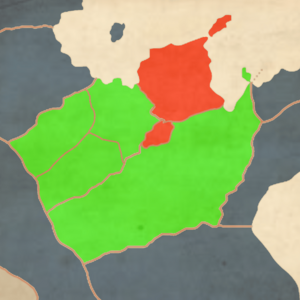War of the Two Coalitions (Pacifica)
| War of the Two Coalitions | |||||||
|---|---|---|---|---|---|---|---|
 Map of the two coalitions. Green: First Coalition Red: Second Coalition | |||||||
| |||||||
| Combatants | |||||||
| Triangular Empire | Tzara, Ivaraad | ||||||
| Strength | |||||||
|
~600,000 Ikarnian, Narussian, Ranarasi troops ~150,000 Losavral troops ~ x mercenaries ~560 ships |
~500,000 troops ~580 ships | ||||||
| Casualties and losses | |||||||
|
~160,000 military, 26,000 civilians ~25,000 sailors and merchants |
~130,000 Military, 42,000 civilians ~53,000 sailors and merchants | ||||||
The War of the Two Coalitions was a 22 year long conflict between The First Coalition (The Triangular Empire and its provinces) and the Second Coalition (Tzara and Ivaraad) It is the longest conflict in Indavral history and was the deadliest until the Great War.
Prelude
Tzaran-Atrissian Border dispute
Control of Akon Island
Narussian Trade
Tzaran Condemnation
Mobilization of Tzara and Ikarn
Tactics
Early War
The early war was defined by the rapid modernization of the Triangular armies- the professional Ikarnian troops were still trained primarily with pikes and used older tactics. Tzara, however, had adopted the Arquebus en masse for decades and was mainly trained with quick hit-and-run tactics that were effective against the larger Triangular armies. Furthermore, Tzaran and Ikarnian troops had generally the same amount of training, something rare due to Ikarn's Nonstop Drill. This meant that Ikarn wasn't able to overpower the enemy armies by routing them at every turn, resulting in significant Ikarnian casualties. Overall, Tzaran tactics forced the Ikarnians and to an extent the Narussians and Ranarasi to change- Ranaras had to start developing arqebusses for the Ikarnians to train with, and Ikarnian military strategy had to be rethought. Disorganized milita from the provinces, however, had already been using the arquebus and therefore were better suited to fight the Tzarans- Provincial sharpshooters were essential to the Triangulars holding territory as they reorganized and Ikarnian generals tried their hands with tactics, developing tactics suitable for their men which resembled early volley fire tactics.